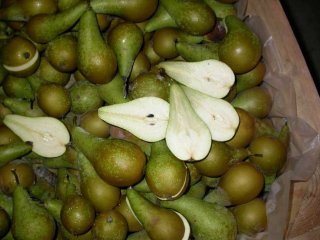
Research Results
Quality prediction and decision support conference pears
A new way of modelling for quality prediction in fresh chains using Bayesian networks is the outcome of a project by Wageningen Food & Biobased Research, carried out within the the GreenCHAINge program. The approach, which can be tailor-made to specific company needs, will support (quality) managers to make the best possible decisions about markets, storage and transport and of Conference pears, across the supply chain.

Objective
The GreenCHAINge project focusses on developing a “smartchain” to improve the quality of fresh fruits in store. For conference pears, export to new markets is of interest.
The objective of this part of the project is to investigate what methods can be used to understand pear quality in the postharvest chain in order to better support decision making for maintaining high quality pears.
Approach
A Bayesian-network model was created that combines various data sources to predict the quality of a batch of pears. The model uses data from practice, input from experts, and outcomes of experiments as input. It integrates multiple conditions and relations between factors involved in quality. This way, all available data are used to finetune the quality prediction. This supports companies in decision making on the postharvest management of the pears.
Predicting firmness
The model currently focusses on predicting the chances of successfully ensuring the desired firmness for a batch of Conference pears at a specific time in its journey through the chain. Model input data are, for example origin, harvest time, storage and transport conditions, and SmartFresh treatment. The model also provides added insight via a sensitivity analysis: which supply-chain factors contribute most to each quality parameter and should, therefore, be prioritised in quality management?